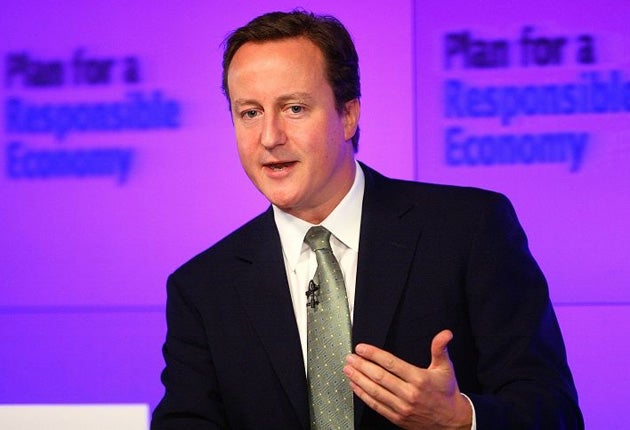Credit crisis truce over as Cameron attacks
Tory leader is accused of 'juvenile political games' after blaming PM for crisis

Your support helps us to tell the story
From reproductive rights to climate change to Big Tech, The Independent is on the ground when the story is developing. Whether it's investigating the financials of Elon Musk's pro-Trump PAC or producing our latest documentary, 'The A Word', which shines a light on the American women fighting for reproductive rights, we know how important it is to parse out the facts from the messaging.
At such a critical moment in US history, we need reporters on the ground. Your donation allows us to keep sending journalists to speak to both sides of the story.
The Independent is trusted by Americans across the entire political spectrum. And unlike many other quality news outlets, we choose not to lock Americans out of our reporting and analysis with paywalls. We believe quality journalism should be available to everyone, paid for by those who can afford it.
Your support makes all the difference.David Cameron came under fire after he ended the political truce on the economy by branding Gordon Brown’s policies a “complete and utter failure”. In a hard-hitting speech to a City audience, Mr Cameron accused the Prime Minister of using the financial crisis to close down debate about its causes and “hide the truth” about his failures.
Denying that he was “talking Britain down”, Mr Cameron said: “I will never pull my punches in explaining how this Government has brought Britain down. Gordon Brown is hoping that his whirlwind of summitry will mean we will forget what has come before … But I won’t forget, and the British people won’t forget. He cannot hide from his mistakes. He cannot hide from the truth. The truth is that over the past 10 years, Britain has built up more personal debt than any other major economy in history.”
Mr Cameron insisted his support for the deal to rescue ailing British banks did not mean the Tories subscribed to Labour’s entire economic policy.
Yvette Cooper, the Treasury Chief Secretary, accused Mr Cameron of playing “juvenile political games”, saying his bi-partisan approach had been exposed as a “short-term gimmick”.
Nick Clegg, the Liberal Democrat leader, described Mr Cameron’s speech as “the worst kind of politics”. He added: “People want practical help at a time of recession not Westminster political point-scoring.”
Arguing that the country needed a change of government to repair its “broken economy”, Mr Cameron promised a range of proposals to help the British people survive the downturn. He said: “The failure to regulate US sub-prime mortgages was an American failure. And the failure to regulate public and private debt in Britain was a British failure.”
Ridiculing Mr Brown’s claim to be a “rock of stability”, he said a Prime Minister who recently spoke of a “golden age” for the City was now talking about “an age of irresponsibility”. Although Tories called for light-touch City regulation until recently, Mr Cameron denied the meltdown suited centre-left rather than centre-right parties. He had always based strategy on “responsibility”, not “freedom”.
“We have had irresponsible capitalism presided over by irresponsible government. Instead, what we need is responsible free enterprise, regulated and supported by responsible government.”
Mr Cameron said Britain was paying the price for Mr Brown’s decision as Chancellor to ride a “wave of debt-fuelled growth” to pay for Labour’s public spending promises. “The result was a combination of irresponsible capitalism and irresponsible government that has brought us to instability and our present crisis,” he said.
“The Chancellor who prided himself on prudence came to believe that he, uniquely in the history of economics, had ended the trade cycle and abolished boom and bust. So he thought the good days would never end, and borrowed and borrowed and racked up the biggest government deficit in the developed world.”
Writing in today’s Daily Telegraph, Mr Brown suggested there would be changes, saying developments around the world were raising “fundamental questions” about the relationship between government and markets. “The first financial crisis of the global age has laid bare the weaknesses of unbridled free markets,” he said.
Subscribe to Independent Premium to bookmark this article
Want to bookmark your favourite articles and stories to read or reference later? Start your Independent Premium subscription today.
Join our commenting forum
Join thought-provoking conversations, follow other Independent readers and see their replies
Comments